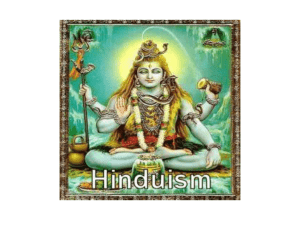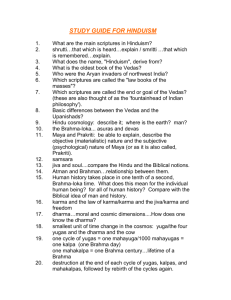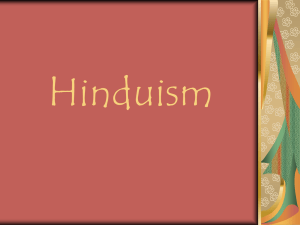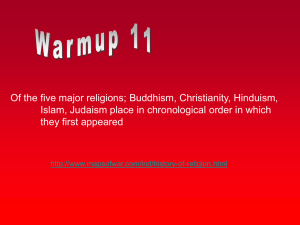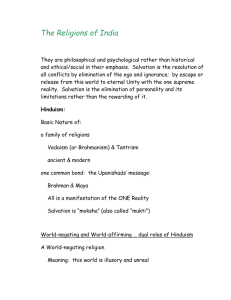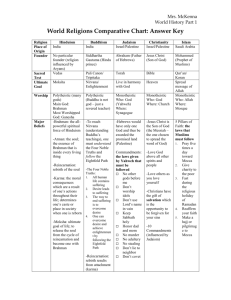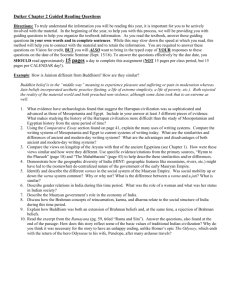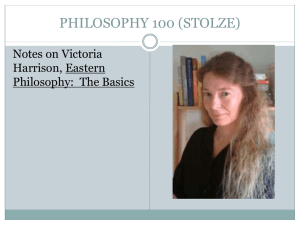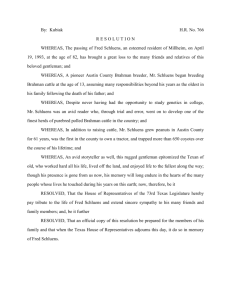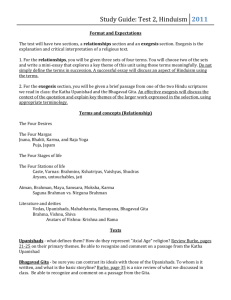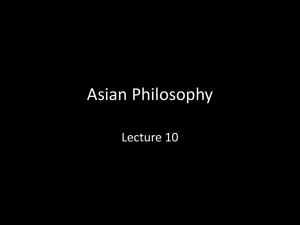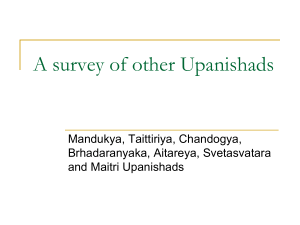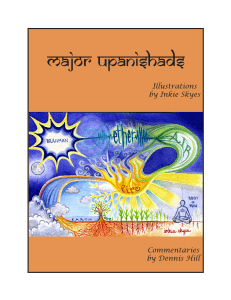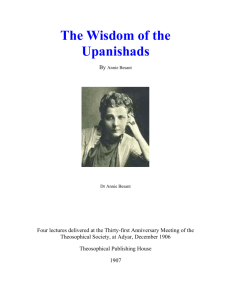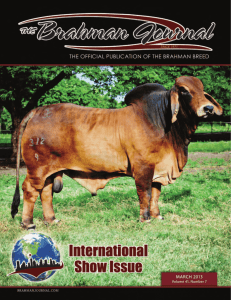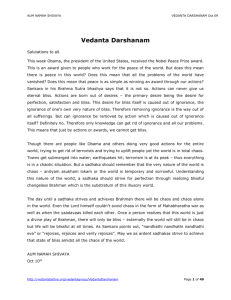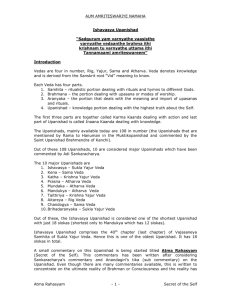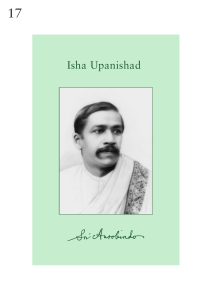Hindu Search for Divine Reality - PHS
advertisement
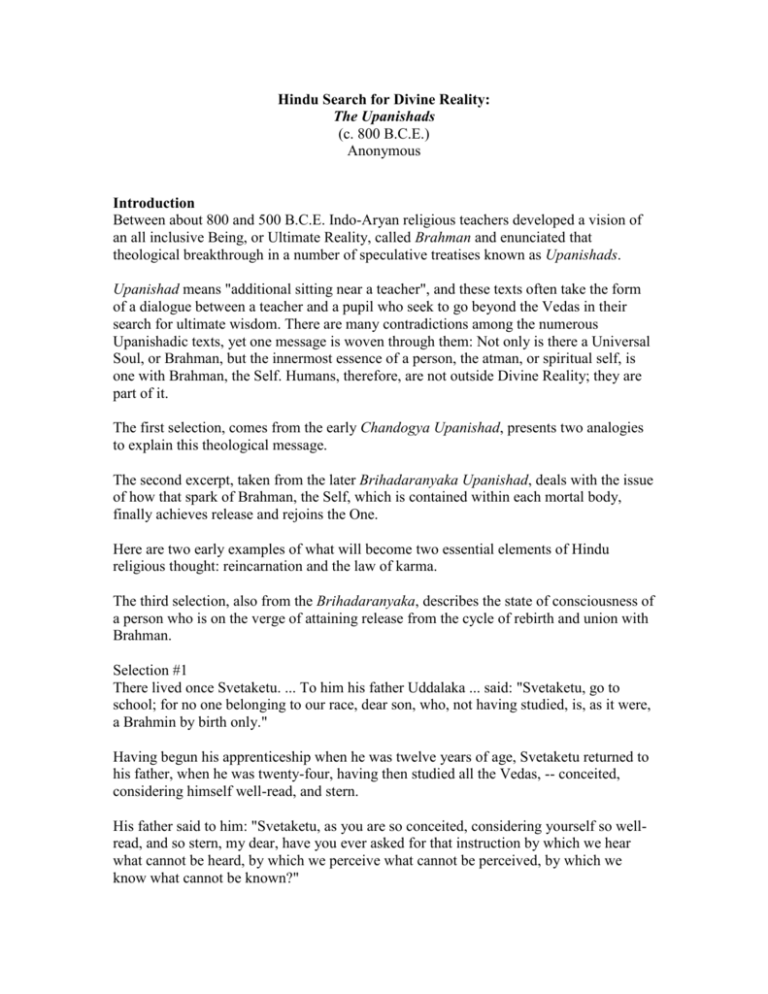
Hindu Search for Divine Reality: The Upanishads (c. 800 B.C.E.) Anonymous Introduction Between about 800 and 500 B.C.E. Indo-Aryan religious teachers developed a vision of an all inclusive Being, or Ultimate Reality, called Brahman and enunciated that theological breakthrough in a number of speculative treatises known as Upanishads. Upanishad means "additional sitting near a teacher", and these texts often take the form of a dialogue between a teacher and a pupil who seek to go beyond the Vedas in their search for ultimate wisdom. There are many contradictions among the numerous Upanishadic texts, yet one message is woven through them: Not only is there a Universal Soul, or Brahman, but the innermost essence of a person, the atman, or spiritual self, is one with Brahman, the Self. Humans, therefore, are not outside Divine Reality; they are part of it. The first selection, comes from the early Chandogya Upanishad, presents two analogies to explain this theological message. The second excerpt, taken from the later Brihadaranyaka Upanishad, deals with the issue of how that spark of Brahman, the Self, which is contained within each mortal body, finally achieves release and rejoins the One. Here are two early examples of what will become two essential elements of Hindu religious thought: reincarnation and the law of karma. The third selection, also from the Brihadaranyaka, describes the state of consciousness of a person who is on the verge of attaining release from the cycle of rebirth and union with Brahman. Selection #1 There lived once Svetaketu. ... To him his father Uddalaka ... said: "Svetaketu, go to school; for no one belonging to our race, dear son, who, not having studied, is, as it were, a Brahmin by birth only." Having begun his apprenticeship when he was twelve years of age, Svetaketu returned to his father, when he was twenty-four, having then studied all the Vedas, -- conceited, considering himself well-read, and stern. His father said to him: "Svetaketu, as you are so conceited, considering yourself so wellread, and so stern, my dear, have you ever asked for that instruction by which we hear what cannot be heard, by which we perceive what cannot be perceived, by which we know what cannot be known?" "What is that instruction, Sir?" he asked.... "Fetch me ... a fruit of the Nyagrodha tree." "Here is one, Sir." "Break it." "It is broken, Sir." "What do you see there?" "These seeds, almost infinitesimal." "Break one of them." "It is broken, Sir." "What do you see there?" "Not anything, Sir." The father said: "My son, that subtle essence which you do not perceive there, of that very essence this great Nyagrodha tree exists. "Believe it, my son. That which is the subtle essence, in it all that exists has its self. It is the True. It is the Self, and you, ... Svetaketu, are it." "Please, Sir, inform me still more, said the son." "Be it so, my child," the father replied. "Place this salt in water, and then wait on me in the morning." The son did as he was commanded. The father said to him: "Bring me the salt, which you placed in the water last night." The son having looked for it, found it not, for, of course, it was melted. The father said: "Taste it from the surface of the water. How is it?" The son replied: "It is salt." "Taste it from the middle. How is it?" The son replied: "It is salt." "Taste it from the bottom. How is it?" The son replied: "It is salt." The father said: "Throw it away and then wait on me." He did so; but the salt exists forever. Then the father said: "Here also, in this body, ... you do not perceive the True, my son; but there indeed it is. "That which is the subtle essence, in it all that exists has its self. It is the True. It is the Self, and you, Svetaketu, are it." And when the body grows weak through old age, or becomes weak through illness, at that time that person, after separating himself from his members, as a mango, or fig, or Pippala-fruit is separated from the stalk, hastens back again as he came, to the place from which he started, to new life.... Then both his knowledge and his work take hold of him and his acquaintance with former things. Selection #2 And as a caterpillar, after having reached the end of a blade of grass, and after having made another approach to another blade, draws itself together towards it, thus does this Self, after having thrown off this body and dispelled all ignorance, and after making another approach to another body, draw himself together towards it. And as a goldsmith, taking a piece of gold, turns it into another, newer and more beautiful shape, so does this Self, after having thrown off this body and dispelled all ignorance, make unto himself another, newer and more beautiful shape.... Now as a man is like this or like that, according as he acts and according as he behaves, so will he be: -- a man of good acts will become good, a man of bad acts, bad. He becomes pure by pure deeds, bad by bad deeds. And here they say that a person consists of desires. And as is his desire, so is his will; and as is his will, so is his deed; and whatever deed he does, that he will reap. And here there is this verse: To whatever object a mans own mind is attached, to that he goes strenuously together with his deed; and having obtained the consequences of whatever deed he does here on earth, he returns again from that world ... to this world of action. Selection #3 So much for the man who desires. But as to the man who does not desire, who, not desiring, freed from desires, is satisfied in his desires, or desires the Self only, his vital spirits do not depart elsewhere, -- being Brahman, he goes to Brahman. On this there is this verse: When all desires which once entered his heart are undone, then does the mortal become immortal, then he obtains Brahman. Now as a man, when embraced by a beloved wife, knows nothing that is without, nothing that is within, thus this person, when embraced by the intelligent Self, knows nothing that is without, nothing that is within. This indeed is his true form, in which his wishes are fulfilled, in which the Self only is his wish, in which no wish is left, -- free from any sorrow. Then a father is not a father, a mother not a mother, the worlds not worlds, the gods not gods, the Vedas not Vedas. Then a thief is not a thief, a murderer not a murderer, a Kandala not a Kandala, a Sramana not a Sramana, a Tapasa not a Tapasa. He is not followed by good, not followed by evil, for he has then overcome all the sorrows of the heart.
